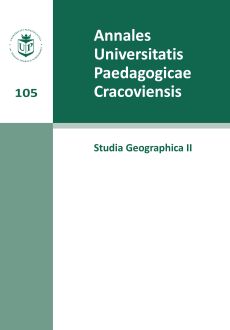The „rational geography” concept as an expression of the constructivist approach in education
Keywords:
Wacław Nałkowski, education, geographical knowledge, constructivism, scienceAbstract
Although the very term “constructivism” appeared rather recently, its concept was knownin science long before now. According to modern cognitive psychology, the reality is created individually in person’s mind. An individual transforms and interprets the flow of information which he receives in his own way, depending on cultural, social, biological or situational context. Nałkowski’s statements concerning perception and thinking from the beginning of the twentieth century, connected with the idea of “rational geography”, were mainly based on intuition, but can serve as the evidence of his broad psychological and pedagogical competence. They see m to be conformable with the principles of constructivism and can be useful nowadays, especially in approaches relative to the so-called emancipatory pedagogy. The main objective of the paper is to assess the Nałkowski’s principles of geographical teaching from the point of view of the concept of constructivism as the modern educational approach.
References
łBenton T., Craib I., 2003, Filozofia nauk społecznych. Od pozytywizmu do postmodernizmu, Wyd. Dolnośląskiej Szkoły Wyższej Edukacji TWP, Wrocław.
Bruner J.S., 1978, Poza dostarczone informacje: studia z psychologii poznania, PWN, Warszawa.
Bruner J.S., 2006, Kultura edukacji, Universitas, Kraków.
Czerepaniak-Walczak M., 2006, Pedagogika emancypacyjna. Rozwój świadomości krytycznej człowieka, GWP, Gdańsk.
Donaldson M., 1986, Myślenie dzieci, Wiedza Powszechna, Warszawa.
Klus-Stańska D., 2006, Behawiorystyczne źródła myślenia o nauczaniu, czyli siedem grzechów głównych wczesnej edukacji, [w:] D. Klus-Stańska, E. Szatan, D. Bronk (red.), Wczesna edukacja. Między schematem a poszukiwaniem nowych ujęć teoretyczno-badawczych, Wyd. Uniwersytetu Gdańskiego, Gdańsk, s. 15–28.
Kohlberg L., Mayer R., 2000, Rozwój jako cel wychowania, [w:] Z. Kwieciński (red.), Alternatywy myślenia o/dla edukacji, IBE, Warszawa, s. 21–66.
Korczak J., 1978, Pamiętnik, [w:] J. Korczak, Pisma wybrane, t. IV, Nasza Księgarnia, Warszawa, s. 299–376.
Kuhn T., 2001, Struktura rewolucji naukowych, Fundacja Aletheia, Warszawa.
Macnaghten P., Urry J., 2005, Alternatywne przyrody. Nowe myślenie o przyrodzie i społeczeństwie, Wyd. Naukowe Scholar, Warszawa.
Madejski J., 2006, Konstruktywizm Ernsta von Glaserfelda: wiedza jako wynalazek, [w:] E. Kuźma, A. Skrendo, J. Madejski (red.), Konstruktywizm w badaniach literackich. Antologia, Universitas, Kraków, s. 117–130.
Mizerek H., 1999, Dyskursy współczesnej edukacji nauczycielskiej. Między tradycjonalizmem a ponowoczesnością, Uniwersytet Warmińsko-Mazurski, Olsztyn.
Nałkowski W., 1920, Zarys metodyki geografii, wyd. II, Wydawnictwo M. Arcta w Warszawie, Poznań–Łódź–Lublin–Wilno.
Nałkowski W., 1952, Wybór pism, Zakł. Nar. im. Ossolińskich, Wrocław.
Nałkowski W., 1968, Dydaktyka geografii, oprac. G. Wuttke, PZWS, Warszawa.
Okoń W., 2001, Nowy słownik pedagogiczny, Wydawnictwo Akademickie „Żak”, Warszawa.
Rozmowa Niklasa Luhmanna z Gerhardem Johannem Lischką, 2006, przeł. W. Wojtowicz, [w:] E. Kuźma, A. Skrendo, J. Madejski (red.), Konstruktywizm w badaniach literackich. Antologia, Universitas, Kraków, s. 25–46.
Sadoń-Osowiecka T., 2009, Konstruowanie wiedzy geograficznej w klasach gimnazjalnych. Możliwości i zaniedbania, Oficyna Wydawnicza Impuls, Kraków.
Steinberg S., 2006, Critical Cultural Studies Research. Bricolage in Action, [w:] K. Tobin, J.L. Kincheloe (ed.), Doing Educational Research. A Handbook, Sense Publisher, Rotterdam-Taipei, s. 117–138.
Trzebiński J., 2002, Narracyjne konstruowanie rzeczywistości, [w:] J. Trzebiński (red.), Narracja jako sposób rozumienia świata, GWP, Gdańsk, s. 17–42.
Tuan Y.F., 1977, Przestrzeń i miejsce, PIW, Warszawa.
Downloads
Published
Issue
Section
License
The submission of a paper to be published is synonymous with an agreement to transfer the copyright free of charge from the author to the publisher. The author also agrees to permit the publisher to publish the paper in printed form, open access online form, digital library form and other digital platforms with which the publisher has or will have a publishing agreement. Furthermore, the author agrees to not limit the number of copies that may be printed or issued by the publisher. In the case of co-authored papers, it is assumed that the corresponding author is authorized to represent the remaining co-authors in this respect. Authors are requested to sign a copyright declaration.

